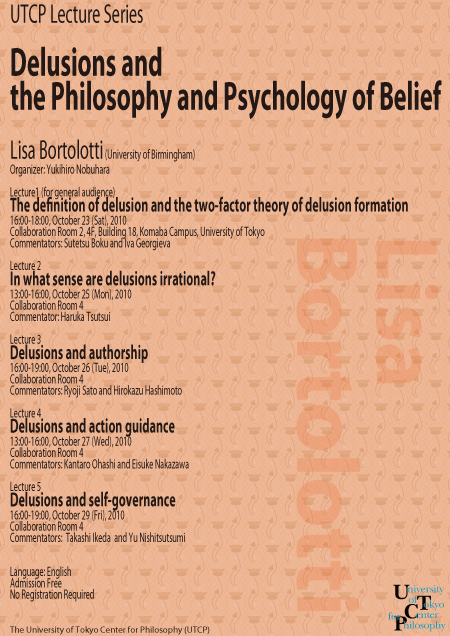
|
Title: | UTCP Lecture Series "Delusions and the Philosophy and Psychology of Belief"Finished |
||
|---|---|---|---|---|
| Date: | October 23-29, 2010 |
Place: | Collaboration Room 2 and 4, 4F, Building 18, Komaba Campus, University of Tokyo |
|
Lecturer: Lisa Bortolotti (University of Birmingham)
Organizer: Yukihiro Nobuhara (University of Tokyo)
Lecture 1 (for general audience)
The definition of delusion and the two-factor theory of delusion formation
16:00-18:00, October 23 (Sat), 2010
Collaboration Room 2, 4F, Building 18, Komaba Campus, University of Tokyo
Commentators: Sutetsu Boku and Iva Georgieva
Lecture 2
In what sense are delusions irrational?
13:00-16:00, October 25 (Mon), 2010
Collaboration Room 4
Commentator: Haruka Tsutsui
Lecture 3
Delusions and authorship
16:00-19:00, October 26 (Tue), 2010
Collaboration Room 4
Commentators: Ryoji Sato and Hirokazu Hashimoto
Lecture 4
Delusions and action guidance
13:00-16:00, October 27 (Wed), 2010
Collaboration Room 4
Commentators: Kantaro Ohashi and Eisuke Nakazawa
Lecture 5
Delusions and self-governance
16:00-19:00, October 29 (Fri), 2010
Collaboration Room 4
Commentators: Takashi Ikeda and Yu Nishitsutsumi
Language: English
Admission Free
No Registration Required
⇛ [Report]

Download (PDF, 370KB)
[Abstracts and Background readings]
1. The definition of delusion and the two-factor theory of delusion formation.
• Abstract: In the DSM delusions are defined in epistemic terms, as irrational beliefs. But it is not enough to have irrational beliefs in order to be diagnosed with clinical delusions. How can the DSM definition of delusion be improved? Should it make reference to the effects of delusions on psychological well-being? I shall introduce the two-factor theory of delusion formation and discuss its applicability to other phenomena, such as confabulation, self-deception and beliefs induced by hypnosis. Is this theory compatible with the DSM definition?
• Background readings: L Bortolotti, R Cox, A Barnier forthcoming, Can we recreate delusions in the laboratory? Philosophical Psychology; L Bortolotti forthcoming, Classification and diagnosis in psychiatry: delusions and confabulations, Paradigmi. Also, see chapter 1 of L Bortolotti 2009, Delusions and Other Irrational Beliefs, Oxford University Press.
2. In what sense are delusions irrational?
• Abstract: Delusions are both procedurally and epistemically irrational. One aspect of their being irrational is that they are not well supported by the available evidence and they are not adequately revised in the light of new evidence. Another aspect of their being irrational is that they are not well integrated in the person’s system of beliefs and may be inconsistent with other beliefs the person holds. But delusions are not alone in exhibiting these forms of irrationality. There are inconsistencies in ordinary belief systems, as the literature from cognitive dissonance shows, and superstitious and prejudiced beliefs can be just as insulated from evidence and as resistant to change as delusions.
• Background readings: L Bortolotti 2003, Inconsistency and interpretation, Philosophical Explorations VI(2), 109-123; L Bortolotti 2005, Delusions and the background of rationality, Mind & Language 20(2), 189-208. Also, see chapters 2 and 3 of L Bortolotti 2009, Delusions and Other Irrational Beliefs, Oxford University Press.
3. Delusions and authorship.
• Abstract: People with delusions sometimes fail to give reasons for their delusions – this may signal a lack of commitment towards the content of the delusion. Borrowing the notion of authorship from Richard Moran, I suggest that in those cases the person does not author her delusion, and this is a failure of self-knowledge as well as a failure of rationality. I shall consider thought insertion in some detail and maintain that, with respect to the inserted thought, the failure of authorship is also accompanied by a failure of ownership.
• Background readings: L Bortolotti and M Broome2008, Delusional beliefs and reason giving, Philosophical Psychology 21 (6), 801-821; and L Bortolotti and M Broome 2009, A role for ownership and authorship of thoughts in the analysis of thought insertion, Phenomenology and the Cognitive Sciences 8 (2), 205-224. Also, see chapters 4 and 5 of L Bortolotti 2009, Delusions and Other Irrational Beliefs, Oxford University Press.
4. Delusions and action guidance.
• Abstract: One standard objection to delusions being beliefs in authors such as Sass and Gallagher is that delusions fail to guide action in the relevant circumstances. This is known in the literature as the phenomenon of double bookkeeping: the person does not act in a way that is consistent with the delusional report and there seems to be a gap between what is said and what is done. I suggest that double bookkeeping does not give us reasons to deny the belief-status of delusions, and that people may fail to act on their delusions because they fail to acquire or sustain their motivation to act.
• Background readings: L Bortolotti 2010, Double bookkeeping in delusions: explaining the gap between saying and doing, in Frankish, Buckareff and Aguilar (eds.) New Waves in the Philosophy of Action, Palgrave. Also, see chapter 4 of L Bortolotti 2009, Delusions and Other Irrational Beliefs, Oxford University Press.
5. Delusions and self-governance.
• Abstract: I argue that the capacity for self-governance depends on the capacity to develop a self-narrative which encompasses the capacity to endorse attitudes and actions on the basis of reasons. Success in self-governance depends on the coherence of self-narratives and on their correspondence to real life events. My thesis is that, in most cases, people with delusions have the capacity for self-governance, but are unlikely to be successful at governing themselves. This is because they are likely to demonstrate failures of rationality and self-knowledge that impact on the coherence of their self-narratives and the correspondence between these narratives and real life events.
• Background readings: M Broome, M Mameli and L Bortolotti, Moral responsibility and mental illness: a case study, Cambridge Quarterly of Healthcare Ethics 19 (2), 179-187; L Bortolotti, R Cox, M Broome and M Mameli in press, Rationality and self-knowledge in delusions and confabulations: implications for autonomy as self-governance, in Radoilska (ed.) Autonomy and Mental Illness, Oxford University Press. Also, see chapter 5 of L Bortolotti 2009, Delusions and Other Irrational Beliefs, Oxford University Press.






